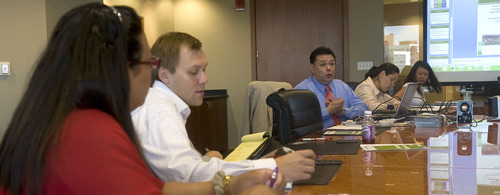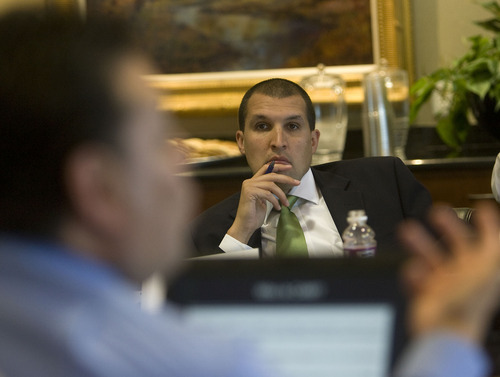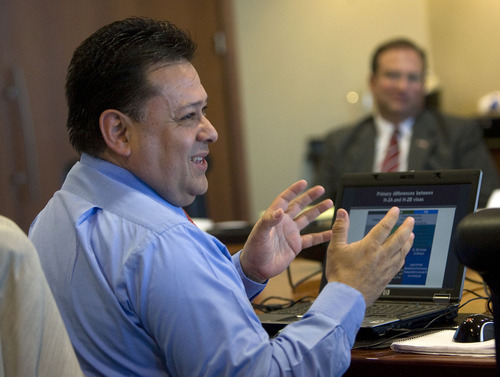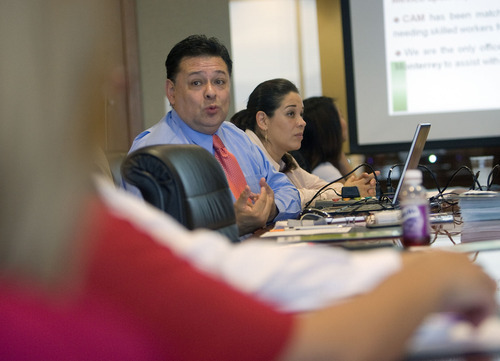This is an archived article that was published on sltrib.com in 2011, and information in the article may be outdated. It is provided only for personal research purposes and may not be reprinted.
Several Utah industry representatives met Monday with leaders from the Mexican state of Nuevo Leon to learn more about getting guest worker visas through a new partnership forged through a recently signed state law.
But the main thing they learned was really something they pretty much knew all along — until the federal government changes the cap on H2B visas, the state's attempt at hand-holding businesses through the process won't bring a flood of laborers to fill vacant jobs.
Tim Wheelwright, an attorney with Durham Jones & Pinegar and chairman of the Salt Lake Area Chamber of Commerce's Immigration Task Force, said the passage of HB466 showed that the state and its employers want to play by the rules and promote legal immigration, but they are still working within a broken system.
"This didn't do anything to increase the caps, so there's no exceptions," Wheelwright said.
There is an annual cap of 66,000 H2B visas, which are issued generally for hospitality or landscaping work. Once the cap is reached, businesses can't get workers who fit that job profile.
On H2A visas, which are primarily agricultural jobs, there are no caps.
Gov. Gary Herbert signed HB466 as a part of a package of immigration reform bills in March. It was the only bill signed, however, that didn't draw threats of a constitutional challenge because it didn't seek to trump the nation's sovereignty when it came to immigration law.
Carried by Rep. Stephen Sandstrom, R-Orem and Sen. Curt Bramble, R-Provo, HB466 established a pilot program with the Mexican state of Nuevo Leon. In the program, the Mexican state would make guest workers available to Utah business, but they would still have to go through the federal process of applying for and being granted visas.
The law, the bill's sponsors said, was a way to help businesses navigate the somewhat laborious undertaking of applying directly for visas.
However, Herbert has not signed a memorandum of understanding with the state of Nuevo Leon yet, which means there is no official help from the state on guiding businesses through the process. Herbert spokeswoman Ally Isom said the governor was still working through the process.
Attorney General Mark Shurtleff's office said the appointments to an immigration commission, which will establish a formal process for helping businesses apply for the visas, is "almost complete."
The bill called for a 27-member commission made up of state lawmakers and directors of various state departments, including the Department of Commerce and the Department of Workforce Services.
Alejandra Ocadiz Hernandez, director general of Nuevo Leon Unido — which is the Mexican partner in the agreement — said the Utah law was a way for the Nuevo Leon government and Utah liaisons to provide navigation through the process of getting guest workers.
She said in working with other states and employers, they have placed 6,800 workers with more than 300 businesses in the past five years — with 98 percent returning to Mexico when the visa expires. She said the other 2 percent extend visas to continue working.
There is a cost of getting the visa and Hernandez said that is where the partnership is valuable. Nuevo Leon Unido has knowledge of the available pool of workers and can promote the right people for the right jobs.
Ryan Braski, who came to the workshop hosted by the Salt Lake Chamber as a representative of the resorts in Park City, said they would look into the partnership to help get qualified workers to fill mainly housekeeping slots.
But he said the cap on visas is a problem.
"The federal government doesn't seem to take into account supply and demand," he said. "We have jobs we just can't fill."
He said the argument that with high unemployment there would be a flood of citizens to apply for the jobs is simply a fallacy. Braski said most people who have lost their jobs aren't looking for housekeeping work. He also said that people who live in the Salt Lake Valley aren't likely to commute every day up the mountain for work.
"We just don't get the applicants for those jobs," he said.
dmontero@sltrib.comTwitter: @davemontero









